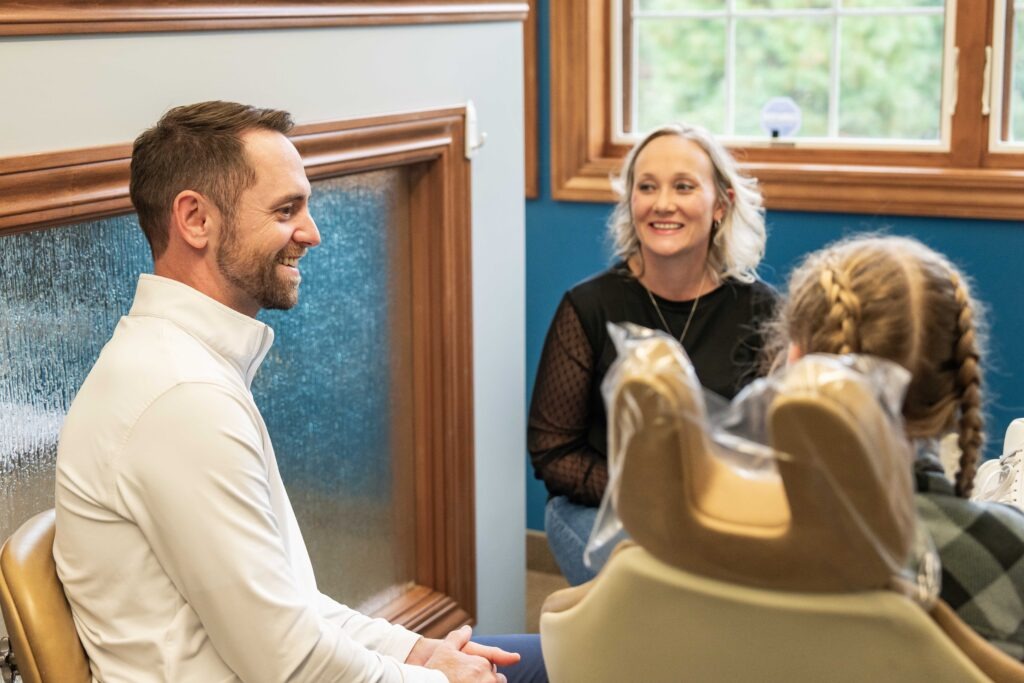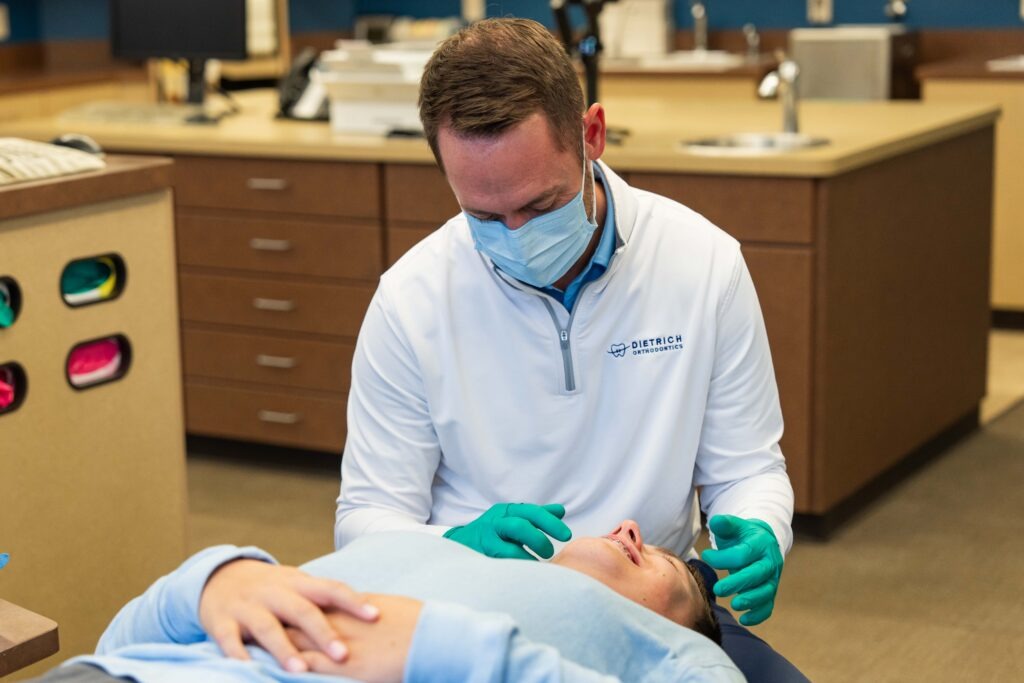Knowing the difference between an orthodontist and a dentist can make all the difference in how you make your dream smile a reality. Dietrich Orthodontics is here to clarify!
What Is A Dentist?
A dentist is a trusted professional who attended dental school and obtained a doctorate in the form of a DDS or DMD, dedicated to ensuring the overall health of your teeth and gums. At the core of their practice is a commitment to preventive care, helping patients maintain a radiant smile and avoid potential dental issues. Dentists diagnose, treat, and manage oral healthcare needs, including cleanings, fillings, gum care, crowns, and more.
One of the primary responsibilities of a dentist is to conduct regular check-ups. These routine visits are more than just a quick look at your teeth; they’re a comprehensive oral health assessment. Dentists look for signs of cavities, gum disease, and other oral health anomalies during these sessions. By spotting potential issues early on, they can recommend treatments or specialists that prevent minor problems from escalating into major concerns.
Whether repairing a damaged tooth or offering guidance on proper brushing techniques, a dentist aims for every patient to leave their office with a confident and healthy smile.
What Is An Orthodontist?
Dr. Dietrich is an orthodontist—a dental specialist focusing on diagnosing, preventing, and treating dental and facial irregularities. While all orthodontists are dentists, not all dentists are orthodontists. Becoming an orthodontist involves additional years of specialized training beyond dental school, honing their expertise in aligning teeth and correcting bites. After dental school, a budding orthodontist will apply and accept an Orthodontic Residency at an accredited program. During the 24-30 month residency, an Orthodontist will only perform orthodontic work, not dentistry.
Orthodontists play a crucial role in oral health’s cosmetic and functional aspects. A misaligned bite or crooked teeth might seem like just aesthetic concerns, but they can lead to other issues, such as difficulty chewing, speech problems, and increased wear and tear on teeth. By addressing these concerns, orthodontists enhance the beauty of a smile and improve overall oral functionality.
One of the most recognizable aspects of orthodontics is the use of metal braces. These devices, which have evolved significantly over the years, are designed to straighten teeth, close gaps, and align the jaw. Dr. Dietrich also uses clear braces, retainers, and other techniques to achieve that perfect smile.
At the heart of orthodontic care is a personalized approach. Every patient’s mouth is unique, and orthodontists like Dr. Dietrich at Dietrich Orthodontics understand this. They craft individualized treatment plans that give each patient care tailored to their needs.
Two Key Differences
Treatment Methods
While there’s some overlap in the tools used by both professionals, orthodontists utilize specific equipment designed for alignment procedures. For instance, the Damon clear bracket system at Dietrich Orthodontics offers a revolutionary approach to braces, ensuring efficient and comfortable treatment.
Treatment Duration
Dental issues that dentists address, like cavities or gum infections, often require shorter treatment durations, ranging from one visit to a few weeks. Orthodontic treatments, however, can span several months to years, as they involve gradual adjustments to achieve desired alignments.
When To See A Dentist Vs. An Orthodontist
Deciding whether to see a dentist or an orthodontist can be a little confusing. Both professionals are integral to maintaining a healthy smile, but they cater to different aspects of dental care. Here’s a guide to help you determine when to consult each expert.
1. Routine Check-ups and Cleanings
Your dentist is the primary point of contact for regular dental check-ups, cleanings, and overall oral health assessments. These visits, typically recommended every six months, help detect cavities, gum disease, and other dental issues early. These are important even during your orthodontic treatment.
2. Toothaches and Emergencies
Experiencing a sudden toothache, swollen gums, or a chipped tooth? It’s best to see your dentist promptly. They are equipped to handle dental emergencies, relieve pain, and recommend further treatments. They can also refer you to a specialist, such as an orthodontist.
3. Alignment Concerns
If you notice issues like crowded teeth, gaps, or misaligned jaws, it’s time to consult an orthodontist. They specialize in diagnosing and treating such concerns, offering solutions like braces, retainers, and other alignment devices.
4. Cosmetic Enhancements
While both professionals can address cosmetic concerns, the nature of the issue dictates the choice. A dentist would be ideal for teeth whitening, veneers, or bonding. However, for straightening teeth or correcting bites, an orthodontist is the expert to see.
5. Specialized Dental Devices
If you’re considering treatments like traditional braces or palate expanders, an orthodontist like Dr. Dietrich can guide you through the process and provide optimal results.
6. Post-Orthodontic Care
After completing orthodontic treatments, regular visits to the orthodontist are essential for monitoring and ensuring that teeth remain in their corrected positions. They’ll provide retainers and give guidance on their usage.
7. Collaborative Care
It’s worth noting that dentists and orthodontists often work in tandem. For instance, a dentist might address cavities or gum issues before starting orthodontic treatment. Similarly, an orthodontist might refer patients to a dentist for specific dental procedures.
Discover What Orthodontics Can Do For You!
While all oral healthcare professionals are dedicated to ensuring radiant smiles, their specializations cater to different facets of dental care. Whether you need a routine check-up, are considering braces, or are seeking cosmetic enhancements, it’s essential to consult the right expert. Dr. Dietrich and his team are committed to providing top-tier orthodontic care tailored to each patient’s unique needs at Dietrich Orthodontics. If you have any concerns about your teeth or bite alignment, don’t hesitate. Please schedule a free consultation with us today and take the first step towards a healthier, more confident smile.


